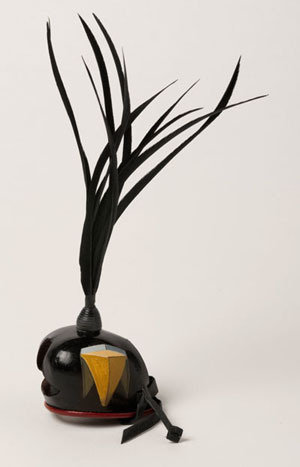Jasmina Cibic
dal 29/9/2011 al 28/10/2011
Segnalato da
29/9/2011
Jasmina Cibic
Ersatz@NGB, London
In the work of the Slovenian artist Jasmina Cibic there is frequently an approach of the tensions that exist between things; more usually than not, abstract and notional concepts - art and craft or politics and aesthetics, for example - that remain open, up for debate and not easy to encapsulate. However, Cibic's work does not bring its particular focus to the uneasy ground that lies between profound and vast abstract phenomena from a naive position.

Ersatz is proud to announce 'Flock' the first London solo exhibition by Jasmina Cibic at its London pop-up space.
In the work of the Slovenian artist Jasmina Cibic there is frequently an approach of the tensions that exist between things; more usually than not, abstract and notional concepts – art and craft or politics and aesthetics, for example- that remain open, up for debate and not easy to encapsulate. However, Cibic's work does not bring its particular focus to the uneasy ground that lies between profound and vast abstract phenomena from a naïve position. Hers is a knowing eye that casts its investigation into unclear spaces – for example the relative statuses of the art object or the craft object- fully informed by an art historical knowledge and an awareness of political and cultural theory.
This, of course, is something that might one might expect of an artist arising from a society as much at the cusp of things as the work itself. Historically Slovenia itself has existed on the very boundary of many things: western Europe versus eastern Europe; communism versus capitalism; Europe versus Eurasia or even arguably as the furthermost member region of the Habsburg Empire, if not always entirely 'willing' then at least less prone to violent uprising against the imperial centres of control.
Both directly and indirectly ideas and imagery connected with all of these complex notions arise in the work of Cibic. This is perhaps most overtly clear in the image of the bird of prey that snakes its way through the site-specific project that Jasmina Cibic will produce for her solo exhibition in London. Comprising video, photography, sculptural objects and site specific interventions in response to the very particular space of Ersatz's pop-up gallery in London, the project will incorporate works that use the bird of prey as a strong leitmotif.
Drawing on everything from the iconography of the bird of prey as a symbol of state power to its subsequent assimilation into commercial branding strategies, fully prompting the audience to consider exactly how the two are connected, Cibic's work often has a subtle transgression about it. It is often defiantly aesthetic, sensuous and almost seductive, highlighting the potential for beauty within the manifest objects.
For example, a new film work focuses on the movements of trained falcons at once powerful historical symbols -perhaps the first 'luxury toys' of ancient European nobles- and understandably animals that would come to feature, together with numerous other birds of prey, in the language of heraldry; the visual shorthand for state and powerful clans alike. Through linking the moving image to other works that highlight the simultaneity of traditional craft and the encapsulation of luxury and power that surround the birds – for example in the delicate falcon hoods- Cibic both teases us with the undoubted seduction of such loaded symbols before posing serious questions about how such iconography is subsequently harnessed to altogether more quotidian political or commercial agendas. And, of course, somewhere within the deluge of ideas contained in the works, there is also something of a romantic bent; a poetic elegy to the natural beauty of these birds now reduced to tourist souvenirs or the detritus of spectacle.
This quality of directly addressing some of the same theoretical or political concerns that are familiar ground in the work of artists from the 'post-Communist European mainland', yet always doing so in a way that is different from many of the artists' languages addressing similar concerns, makes her work immediately notable, memorable and occasionally controversial. In this sense it is work that is comparable – whilst creating its own unique path entirely- with other Slovenian artists -such as the Irwin collective- who have also found Slovenia's unique position, brimming with dichotomy, a rich ground for contemplation and discussion that turns its steely gaze on the once hallowed tenets of 'the artist of the socialist state' as much as critiquing more recent global developments.
Jasmina Cibic (b.1979) travelled from her native Slovenia to first study at Accademia di Belle Arti di Venezia where she later worked as a tutor before completing her MA in Fine Art at Goldsmiths College, London in 2006. Her projects and exhibitions include 'The Object of the Spectacle', Galerija Škuc, Ljubljana; 'U3 – 6th Triennial of Contemporary Art', curated by Charles Esche, Museum of Modern Art Ljubljana; 'Vordemberge-Gildewart Award', Mestna galerija Ljubljana; 'The Secret of the Ninth Planet', California College of the Arts, San Francisco; 'Museum on the Street', Museum of Modern Art Ljubljana; 'Airport Projects', Galerija Ganes Pratt, Ljubljana; 'Natural Relations', Galerija Škuc, Ljubljana; 'Other Mythologies', Maribor Art Gallery, Maribor; 'Present State', Five Years Gallery, London; 'Tourists Welcome', Ljubljana International Airport and 'Landescape', Künstlerhaus Graz. Art Catlin recently awarded her the special commission for a work to be on permanent display in the new headquarters of Catlin in the City of London. Jasmina Cibic lives and works in London.
Private view Friday 30 September; 18 to 21
ersatz@NGB
76 Willesden Lane, London
Fri & Sat 12:00 - 18:00 and by appointment
free admission



